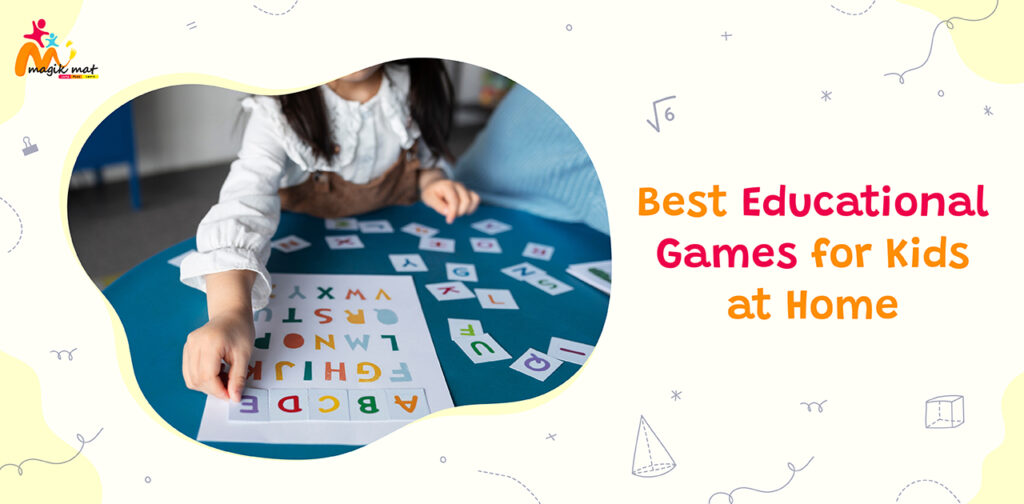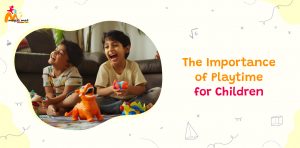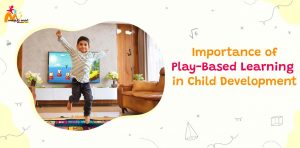Introduction
In today’s digital age, finding engaging and educational activities for children is very crucial. While screens and gadgets dominate much of the modern entertainment landscape, integrating educational games into their routine can foster holistic development and provide a break from excessive screen time. From enhancing cognitive skills to promoting physical activity and critical thinking, the benefits of these games are numerous. In this blog, we will discuss the 10 best educational games for kids that can be easily enjoyed at home.
Importance of Education Games for Kids
- Engagement and Motivation: Educational games capture children’s attention and motivate them to actively participate in the learning process by making education enjoyable and interactive.
- Skill Development: These games target specific skills such as critical thinking, problem-solving, creativity, and communication, providing a platform for children to develop and strengthen these essential abilities.
- Retention of Information: The combination of visual, auditory, and tactile elements in educational games helps reinforce knowledge and concepts, enabling children to retain information more effectively.
- Stimulating Learning Environment: Educational games foster a dynamic and stimulating learning environment that encourages exploration, nurtures a passion for learning, and encourages children to seek out knowledge independently.
- Personalized Learning: These games cater to different learning styles and paces, allowing children to learn at their own speed and providing personalized experiences that adapt to individual needs and preferences.
- Social and Emotional Development: Multiplayer educational games encourage teamwork, cooperation, and communication, fostering social skills and emotional intelligence among children.
- Real-World Application: Certain educational games simulate real-life scenarios, providing practical insights and preparing children for various situations they may encounter in the real world.
- Technology and Digital Literacy: Educational games that incorporate technology help children develop digital literacy skills from a young age, preparing them for the increasingly technology-driven modern world.
10 best Educational Games for Kids at Home
1.Calculator Hopscotch: Calculator Hopscotch combines physical activity with basic arithmetic. Children can solve math problems by hopping on the answer, making learning math interactive and fun.
2.Good Touch and Bad Touch: It is an interactive game available on the Magik Mat, is an innovative and effective way to educate children about personal safety. With this game, children can learn about the importance of differentiating between safe and unsafe touches in a fun and engaging manner. By navigating through the game, they can understand the concept of personal boundaries and develop the confidence to recognize and respond to inappropriate touches. This interactive approach not only makes learning about personal safety more accessible but also empowers children to protect themselves in a supportive and nurturing environment.
3.Jump Rope Spelling Game: This game turns spelling into an enjoyable physical activity. Kids spell out words while jumping rope, combining exercise with language learning.
4.Sudoku: Sudoku is an excellent game for enhancing logical thinking and problem-solving skills. With varying levels of difficulty, it challenges children to think critically and strategically.
5.Geography Quiz: A fun way to learn about the world, a geography quiz can help children expand their knowledge of different countries, capitals, landmarks, and more. Parents can create personalized quizzes or utilize online resources for a more interactive experience.
6.Ninja: The Ninja game on the Magik Mat encourages physical activity and improves coordination. It involves following patterns on the mat, promoting agility and movement while having a blast.
7.Hangman: Hangman is a classic word-guessing game that aids in vocabulary building and spelling. It encourages critical thinking and can be played with words of varying complexity.
8.Monopoly: Monopoly is not just a board game; it’s an opportunity for children to learn about money management, decision-making, and basic economics. Through this game, kids can grasp essential financial concepts in a playful setting.
9.Tangrams: Tangrams are excellent for enhancing spatial awareness and geometric reasoning. By manipulating shapes to form various figures, children can improve their understanding of spatial relationships and geometry.
10.Pictionary: Pictionary is a fantastic game for fostering creativity and improving communication skills. Children can express ideas through drawings, enhancing their artistic abilities while having fun with friends and family.
How do you incorporate educational games into kids’ daily routines?
Incorporating educational games into a child’s daily routine can be seamlessly achieved through various practical strategies. Designating specific play times throughout the day for educational games ensures consistency and regularity in their learning schedule. Creating a dedicated learning corner at home, stocked with a variety of educational games, can foster an inviting and organized environment for children to engage in playful learning activities.
Rotating the selection of games periodically helps sustain children’s interest and accommodates their diverse learning needs. Integrating educational games into daily chores or activities infuses an element of fun and engagement, making learning math or language skills a part of everyday tasks. Encouraging family participation in these game sessions not only promotes bonding but also creates a supportive and collaborative learning atmosphere within the household. By setting achievable learning goals, children can track their progress and celebrate their achievements, fostering a sense of accomplishment and motivation.
Additionally, wise utilization of technology, integration with the child’s academic curriculum, encouragement of creativity, and positive reinforcement all contribute to a holistic approach to incorporating educational games into a child’s daily routine, fostering a love for learning, and supporting their overall development in an enjoyable and engaging manner.
Conclusion: The significance of educational games for children cannot be overstated. These games not only make learning enjoyable and engaging but also contribute to the holistic development of children by fostering critical skills, enhancing retention of information, and promoting a stimulating and personalized learning environment. Through the encouragement of social interaction, emotional development, and practical application of knowledge, educational games play a vital role in preparing children for the challenges of the future. By recognizing and harnessing the benefits of educational games, parents and educators can effectively supplement traditional learning methods and help children thrive academically, socially, and emotionally.





